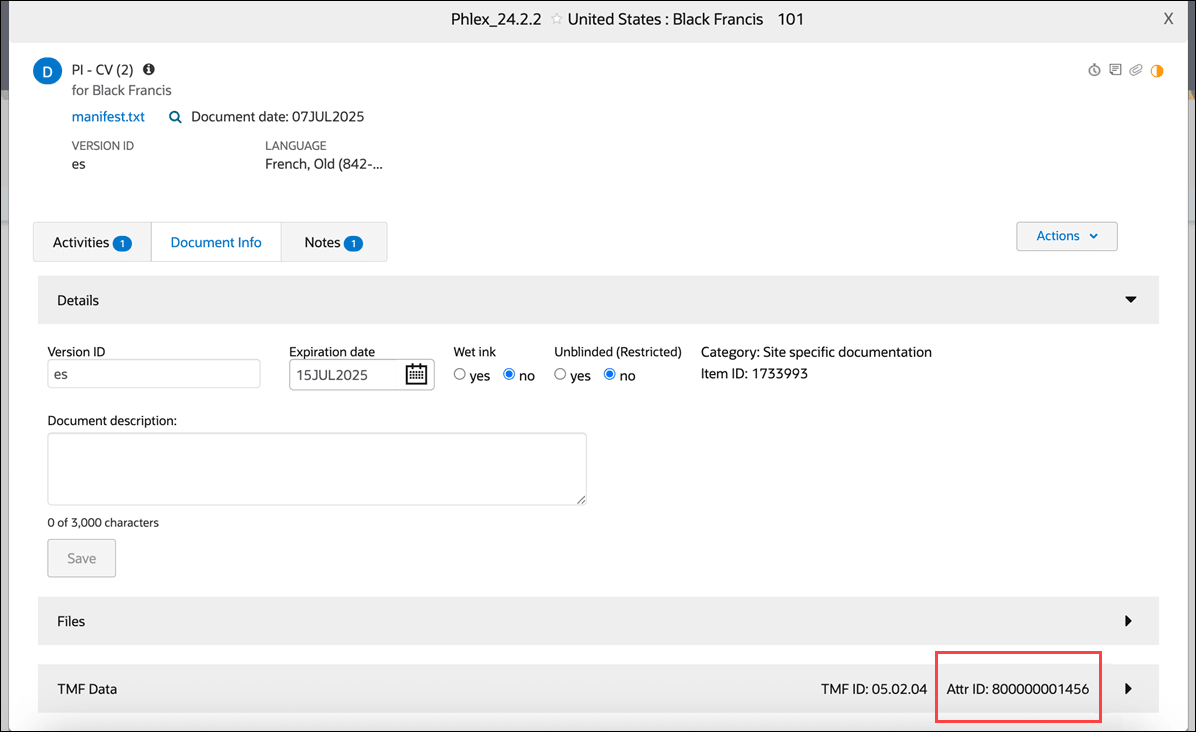Phlex integration
With release 24.2.2, Oracle Site Activate introduces enhancements in support of Phlex eTMF integration.
Site Personnel Surname and Expiry date
We added a new configuration option labeled “Requires Site Personnel Surname for Phlex integration” to Configuration Designer and the internal item configuration area in Oracle Site Activate. When checked, it flags the item for inclusion of Site Personnel Surname metadata in Phlex eTMF messages.
We also added a flag for items that should include the Document Expiry date in Phlex Integration eTMF message. The new check box settings that enable this functionality have been added to Configuration Designer and the internal item configuration area in Oracle Site Activate. If a user populates the Expiration Date field for an item in Oracle Site Activate, the eTMF message will include an "Expiry Date" attribute. If the Expiration Date field is available on the item but is not populated, the eTMF message includes the field with a null value.
Item Effective date
eTMF messages will now include Effective date when this option is enabled at the account level. If the field is not populated in the item in Oracle Site Activate, the eTMF message will send a null value with the Effective date attribute. Please contact your Oracle services representative to discuss enabling this option for your account.
Attribute ID
With this release, “Reference Code” is now updated to “Attribute ID” to reflect use of the Phlex Attribute ID in eTMF integrations. An Oracle representative, or a customer resource with permission to access Configuration Designer, will populate the customer-provided Attribute ID to the appropriate artifacts in Configuration Designer and publish the configuration to Oracle Site Activate.
In Oracle Site Activate, the Attribute ID appears in the internal artifact configuration area, the user interface, and the eTMF message when the Vendor type is “Phlex.” In the Oracle Site Activate user interface, the Info tab in item modals will label the Attribute ID as “Attr ID” in the TMF Data section. eTMF messages will include the Attribute ID field as attribute_id.

Supported file types
Development for this release included testing the Phlex eTMF integration to ensure it supports the following file types: .pdf, .doc, .docx, .xls, .xlsx, .jpg, .jpeg, .tif, .tiff, .zip, .png, .gif, .odt, .rar, .tar, .bmp, .msg, .ppt, .pptx, .eml, and .xml.
Note:
Oracle Site Activate allows upload of the following additional file types; however, they are not supported in Phlex eTMF integration: xlsm, gzip, gz, 7z, 7zip, bz2, rtf, txt, csv, tab, pps, pot, pptm, potx, potm, xlw, xlt, psd, sxw, stw, sxc, stc, sxi, sti, key, pages, and numbers.
Default and supported languages
We enhanced Phlex eTMF integration to default to English when a document’s language field does not have any value (null). When generating an eTMF message for Phlex, if a document in Oracle Site Activate doesn’t specify a language, the “Language” attribute in the Transformed Message section will default to “English-American (Default).”
For reference, the Phlex eTMF integration supports the languages listed in the table below.
| Language | Language code |
|---|---|
| Dutch | nl |
| English | en |
| French | fr |
| German | de |
| Hebrew | he |
| Hungarian | hu |
| Italian | it |
| Lithuanian | lt |
| Polish | pl |
| Slovak | sk |
| Spanish | es |
API enhancements
As part of our 24.2.2 release, we made the following updates to the eTMF messages to support our Oracle Site Activate-Phlex eTMF integration. They are visible when an endpoint has vendor = Phlex.
- reference_code has been updated to attribute_id
- pi_last_name has been updated to person_full_name, and the format is lastname, firstname
- phlex_requires_sps field is added when configured on an artifact in Oracle Site Activate, and indicates that artifact requires the site personnel surname
- phlex_requires_expirydate field is added when configured on an artifact in Oracle Site Activate, and indicates that artifact requires the document expiry date
- phlex_requires_iprelease is added when configured at the account level and is set to True for all artifacts
Additionally, for all eTMF messages:
- expiry_date is added when configured on an artifact in Oracle Site Activate
- effective_date is added when configured at the Account level
We've updated our API documentation to reflect these changes.
Oracle Site Activate-Phlex eTMF testing recommendations
Before testing, please contact your Oracle services representative to validate settings and configuration for your Phlex eTMF integration. When confirmed, use the steps below for end-to-end testing:
- For a site known to both Oracle Site Activate and Phlex, build an IP package with at least the following artifacts. (Note: the configuration does not currently include study-level artifacts.)
- country level
- country level (Non-English language (See supported languages list above))
- site level - site specific
- site level - PI specific (Site Personnel Surname required)
- site level - staff specific (Site Personnel Surname required and name that exists in two sites)
- one artifact that does not have an Attribute ID defined (Message will fail, and other messages will succeed)
- one artifact with Attribute ID defined, but no file attached (Message will fail per standard eTMF messaging functionality)
- For a country known to both Oracle Site Activate and Phlex, build an IP Release package with at least:
- country level
- country level (Non-English language (See supported languages list above))
- site level optional
- Upload documents to artifacts in Oracle Site Activate, approve all artifacts, and complete the packages
- Check Event Messages:
- Oracle Site Activate should create one eTMF message for each artifact
- Each message should be successful
- If not successful, clear error messages should be returned to guide triage
Parent topic: What's new